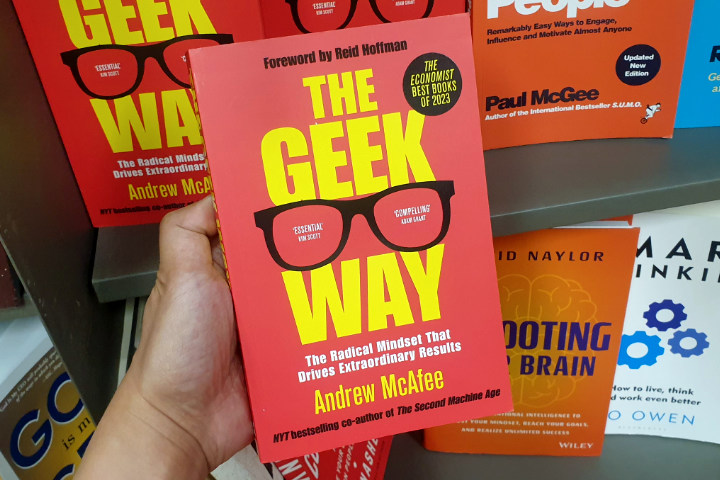An exploration of how tech companies thrive by embracing data-driven decisions, fostering innovation, and promoting collaboration, offering insights for transforming traditional organizations into agile, forward-thinking enterprises.
“The Geek Way” by Andrew McAfee is a fascinating look at how the technological ethos and practices of the geek world are reshaping industries and redefining success in the modern era.
It’s a compelling take on how a shift toward a more data-driven, technology-infused mindset can reshape the way businesses function.
The narrative combines rigorous analysis with an engaging storytelling style that draws readers into the heart of the digital revolution.
McAfee’s insights reveal how the innovative spirit and methodologies of geeks, once confined to the fringes, are now at the center of transformative change across various sectors.
The term “geek” in the book is not a label of disparagement, but as a badge of honor. This might strike many as unusual, especially for those accustomed to the classic, sometimes stereotypical, perception of geeks as the introverted, antisocial figures holed up in basements with their computers.
Geeks are effectively changing things on a global scale consistently.
The author’s writing is both enlightening and entertaining. Striking a balance between deep dives into complex concepts and witty observations that keep the reader engaged.
One of the book’s most gripping aspects is its examination of open-source collaboration.

It illustrates how the geek community’s commitment to sharing knowledge and resources has fueled unprecedented innovation, challenging traditional models of competition and intellectual property.
It’s a testament to the power of collective intelligence, where many minds working in harmony can achieve feats that were once thought impossible.
Geek influence has quietly but powerfully altered industries, processes, and even society as a whole.
The content delves into the democratization of technology, highlighting how geeks have democratized access to powerful tools and platforms, empowering individuals and small teams to tackle challenges that were previously the domain of large corporations.
This shift has leveled the playing field, enabling a new wave of entrepreneurs to disrupt established industries and create novel solutions to age-old problems.
McAfee likens this phenomenon to David armed with a digital slingshot, ready to take Goliath to the cleaners with creativity and agility.
Throughout the book, it emphasizes the importance of experimentation and failure as integral components of success. There are also various anecdotes of tech pioneers who embraced failure as a learning opportunity, ultimately leading to groundbreaking innovations.
The geek way is driven by curiosity, experimentation, and agility. It’s a mentality that encourages continuous learning and improvement, never settling for the status quo.
This mindset shift challenges the fear of failure that often stifles creativity in traditional environments. Every story begins as a rough draft, refined through revisions and iterations until it truly shines.
The argument is that a company’s success is increasingly dependent on adopting this mindset. The traditional business model, rooted in structure, hierarchy, and rigid plans, is being outpaced by companies that understand and leverage the unpredictable forces of technology and data.
The writing is also peppered with humor, making complex ideas more relatable and memorable.
Geeks are like the wizards of silicon, casting code spells that transform our digital landscape. It underscores the remarkable impact that tech-savvy innovators have on shaping our world as we know it.
This trend of disruptions is something that we are observing in the world today.
Another salient theme in the book is the value placed on transparency and accountability within geek culture. Openness fosters trust and collaboration, paving the way for more ethical and responsible technological development.
This ethos contrasts sharply with the often opaque practices of traditional corporate structures, offering a model for organizations seeking to build credibility and authenticity in an increasingly connected world.
I was particularly struck by the parallels between geek culture and storytelling.
Both disciplines thrive on curiosity, experimentation, and pushing boundaries to uncover new possibilities.
In many ways, geeks are the storytellers of the digital age, crafting narratives through code and data that shapes how we interact with technology and each other.
Another standout theme of the book is the importance of empowerment.
The author posits that modern companies thrive not by dictating terms from the top but by empowering individuals to make decisions based on data and real-time information.
For example, the rise of decentralized work cultures.
In many ways, the geek way isn’t just about coding. It’s about the freedom to act independently, backed by an entire ecosystem of accessible data and tools.
By democratizing access to information, businesses can encourage creativity at all levels, allowing employees to experiment and learn from their mistakes rather than fear them.
There are also examples of companies that have used this decentralized structure to scale, noting how their success lies in the belief that anyone, from the newest intern to the CEO, can contribute meaningfully to the innovation process.
However, this kind of open-ended experimentation does come with risks, something the author addresses head-on.
It is pointed out that geeks are not risk-averse. They are are just more calculated.
A company embracing the geek mentality must learn to balance the potential for failure with the possibility of breakthrough success.
Companies can manage this tension by embracing failure as part of the process can be liberating.
The journey toward success, as it turns out, isn’t linear. It’s filled with dead ends and detours that often provide more lessons than straightforward paths.
There’s also a very measured argument revolving around the evolving relationship between human intelligence and artificial intelligence.
As automation becomes more widespread, humans must adapt by leaning into the skills that machines are less equipped to handle.
These include creativity, emotional intelligence, judgment and the ability to interpret and respond to complex, ambiguous situations.
It has to evolve into a symbiotic relationship between human ingenuity and machine efficiency.
In a world where algorithms increasingly drive decisions, there is still an inherent need for humans to continue adding the nuanced judgment and empathy that technology still struggles to replicate.
There is a dark side to all of these.
And it’s centered around the ethical implications of new technology and the potential societal disruptions that arise from rapid change. The rise of big data, machine learning, and automation also brings questions of privacy, job displacement, and inequality.
As businesses shift toward automation, they cannot make excuses to sidestep the responsibly they have on social impact.
New tech has to do good for our society and civilisation. Not take it backwards.
Biggest Takeaway
If you immense yourself into the book, you’d eventually realize that embracing geek principles can lead to transformative outcomes not only in business but also in broader societal contexts.
By championing openness, collaboration, and iterative progress, we can create a future where innovation flourishes and diverse voices contribute to shaping our collective destiny.
This book is an insightful journey into the heart of technological transformation.
With engaging prose and thoughtful analysis, it invites readers to explore how geek culture is redefining success in the modern world.
It encourages us to see the world through the eyes of the geeks who thrive on disruption, experimentation, and the excitement of creating something new.
For those curious about the forces driving our digital evolution, this book offers valuable insights and inspiration.
After all, when it comes to navigating the future, it seems wise to follow the geeks’ lead. And remember, in a world driven by data, it’s important to stay byte-sized yet impactful!
And in an age of disruption, adaptability is the key to survival.
The world will continue to evolve in unpredictable ways, and the businesses and individuals who thrive will be those who can navigate change with agility, not just by relying on the tried-and-true but by welcoming the unknown.
It’s not just about how to implement new technologies but how to think about them.
It encourages us to see the world through the eyes of the geeks who thrive on disruption, experimentation, and the excitement of creating something new. If that’s not a way forward, I don’t know what is!




